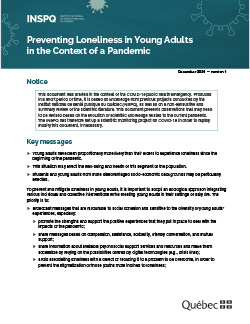Preventing Loneliness in Young Adults in the Context of a Pandemic
Messages clés
- Young adults have been proportionally more likely than their elders to experience loneliness since the beginning of the pandemic.
- This situation may affect the well-being and health of this segment of the population.
- Students and young adults from more disadvantaged socio-economic backgrounds may be particularly affected.
To prevent and mitigate loneliness in young adults, it is important to adopt an ecological approach integrating various individual and collective interventions while meeting young adults in their settings of daily life. The priority is to:
- Broadcast messages that are favourable to social cohesion and sensitive to the diversity of young adults’ experiences, especially:
- promote the strengths and support the positive experiences that they put in place to deal with the impacts of the pandemic;
- share messages based on compassion, assistance, solidarity, friendly conversation, and mutual support;
- share information about available psychosocial support services and resources and make them accessible by relying on the possibilities offered by digital technologies (e.g., crisis lines);
- avoid associating loneliness with a defect or reducing it to a problem to be overcome, in order to prevent the stigmatization of those youths more inclined to loneliness;
- strengthen actions that are conducive to social support, mutual aid, and the resilience of young adults in post-secondary institutions, especially:
- reduce psychosocial and financial impacts of the pandemic by responding to their basic needs (e.g., financial assistance, food security, housing);
- ensure the continuity of services in psychosocial support, taking into account emerging needs related to the pandemic;
- implement peer-support programs and support mutual-aid initiatives that invite students to be kind to each other;
- strengthen actions that support future and new parents, especially:
- Use perinatal interventions to ask questions about their psychological well-being and about their social support network and inform them about resources available in their area;
- promote exchanges with other future and new parents by using the diverse methods available in the context of a pandemic;
- strengthen the actions for physical and built environments that are favourable to social interactions, when the epidemiological situation and public health measures allow for them, especially:
- increase safe access to parks and green spaces;
- support the use of public transportation and the practice of walking and biking through the installation of safe infrastructure;
- document and study the phenomenon of loneliness in young adults including:
- conduct surveys and research to better understand the impact of the pandemic on the loneliness of young adults and the factors contributing to its emergence;
- monitor the feeling of loneliness in different groups and document its long-term effects, especially on students;
- study the role of social media and, more broadly, digital technologies as a tool in disaster response, and their effects on mental health and well-being, including feelings of loneliness


